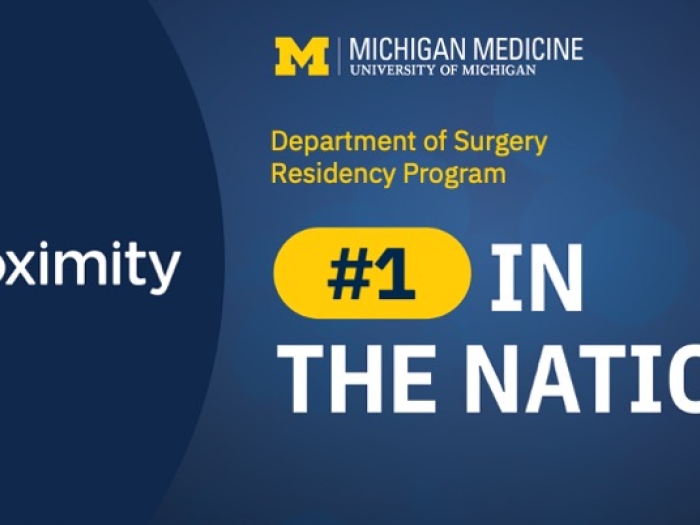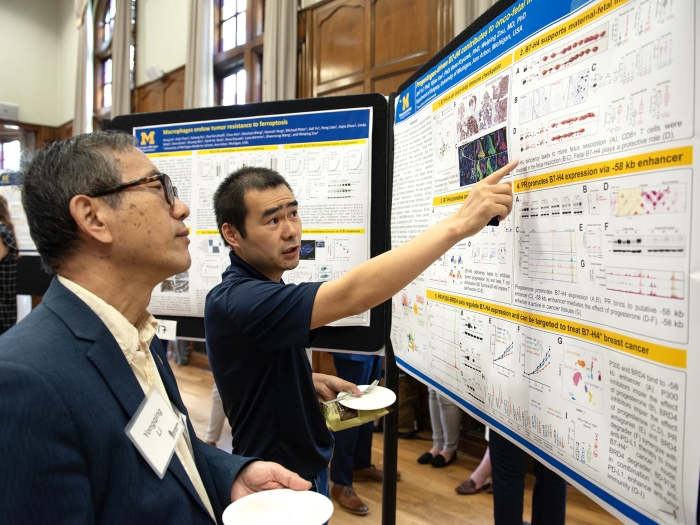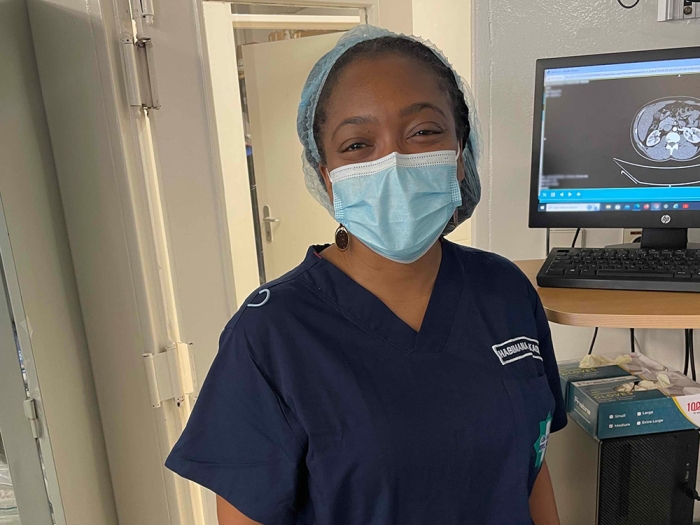
Patient-Centered Surgical Care
Our team provides expert multidisciplinary care, handling complex operations compassionately and efficiently.
We have the expertise and the capacity to manage any surgical need, including high-complexity operations. This experience draws on a legacy of innovation at Michigan, where extracorporeal life support technology was invented and endocrine surgery was perfected, and where today we’re setting the national standard for treatment of burn injuries and cancer.
Across a broad range of specialties, we excel at:
- Multidisciplinary care: By assembling a team of experts from multiple specializations, we can deliver the best care to our patients while also reducing the time patients spend at the hospital — making our clinics a single point of contact for all your questions and needs.
- Complex operations: We have the experience and the expertise to provide care many institutions can’t, receiving referrals from around the country, as well as internationally — all backed by the abundant resources of Michigan Medicine, ranked among the best hospitals in the nation by U.S. News & World Report.
- Patient-centered care: We’re always striving to improve the experience we offer patients, making health care more compassionate and more convenient.
Acute Care Surgery at Michigan provides care for patients with serious trauma and burn injuries, and delivers surgical services for emergencies and for critical care medicine. Our clinical specialties include:
Trauma Surgery: Trauma surgeons are part of a multidisciplinary team of care providers — an approach that’s been shown to improve outcomes for patients recovering from a serious injury. Few institutions have achieved Level 1 Trauma Center verification for both adults and children, a fact that demonstrates our longstanding commitment to providing the best and most responsive resources for the treatment of trauma.
Burn Surgery: Michigan Medicine includes an adult and pediatric Verified Burn Center, making our team of surgeons and scientists recognized leaders in not just burn injury treatment, but also burn prevention, education, and research. We serve as a referral center that can offer treatments not found elsewhere, including fractional CO2 laser treatment of burn scars. Expanding our services regionally, we also coordinate the health care response for burn mass casualties through our Burn Center and the Michigan Department of Health and Human Services, improving the entire state’s readiness for emergency response.
Surgical Critical Care: Surgical Critical Care surgeons care for patients in a surgical and a trauma burn ICU, serving as a tertiary and quaternary care center for patients around the region. Our areas of strength include acute respiratory distress syndrome (ARDS), extracorporeal membrane oxygenation (ECMO), complex ventilator management, hospital-acquired infections, and treatment of major trauma and burns, including wound and skin disorders such as necrotizing soft tissue infection. Our ICUs are award-winning, recognized for their excellence in family-centered critical care.
Emergency General Surgery: Through this service, we provide timely surgical assessment and operative management for general surgery patients with acute conditions. By concentrating the care of a patient in the hands of a single team, we can improve health outcomes through better coordination and better management of each case.
Our approach capitalizes on the wide array of multidisciplinary expertise present at Michigan Medicine, to deliver highly efficient, patient-centered, and expert care. For example, in our Multidisciplinary Colorectal Cancer Clinic, patients may see a colorectal surgeon, a medical oncologist, a radiation oncologist, or a medical geneticist, depending on their needs. We’re frequently able to coordinate multiple appointments in a single day, reducing the burden on patients and providing better care informed by multiple perspectives.
We collaborate with gastroenterologists specializing in Inflammatory Bowel Disease to offer a full array of surgical approaches to the care of Crohn’s Disease and Ulcerative Colitis, including ileoanal pouch procedures. We also work with a variety of specialists in the Michigan Bowel Control Program to evaluate and treat patients with constipation, fecal incontinence, rectal prolapse and other pelvic floor disorders.
Our clinical specialties include:
- Consultation and treatment for diseases of the small intestine, colon, rectum, and anus, including colon cancer, Crohn’s disease, ulcerative colitis, bowel obstruction, chronic constipation, and others. We’re able to provide advanced surgical care for colon and rectal cancer, including complex resections where cancer has invaded the prostate, bladder, spine, or other organs.
- Colonoscopy and endorectal ultrasound for diagnosis, screening, and monitoring of conditions
- Management of hereditary colorectal syndromes, including genetic testing and genetic counseling services
As the first such division of our kind in the country, Endocrine Surgery at Michigan enjoys a strong legacy of advancements in the field with a current team of surgeons with comprehensive experience to treat complex conditions. Through our research, we’re advancing understanding of how cancers develop, and through our training programs, we emphasize independence and in-depth learning to produce excellent future endocrine surgeons. Our clinical philosophy is threefold: Assemble the best multidisciplinary teams; harness the power of technology; and deliver effective and proven surgical techniques with compassion.
Our clinical specialties include:
Parathyroid disease: We’ve performed more than 3,500 parathyroid operations since 2000, offering treatment for both routine cases and the most advanced form of the disease. We’ve developed advanced techniques for monitoring parathyroid hormone production during surgery, and use both minimally invasive and open surgical approaches.
Thyroid disease: As one of the largest endocrine surgical divisions in the U.S., our surgeons perform numerous thyroid surgeries a year, with a track record of lower complication rates and optimal patient outcomes.
Adrenal disease: In their entire career, most doctors will never encounter a single case of adrenal cancer. Our surgeons offer treatment for common conditions and the most advanced types of adrenal disease, including: adrenal cancer, Cushing's syndrome, adrenal nodules, and adrenal tumors.
Endocrine cancer: The Multidisciplinary Endocrine Tumor Program at the University of Michigan is composed of endocrinologists, endocrine surgeons, radiologists, nuclear medicine specialists and oncologists who specialize in all aspects of diagnosis and treatment of endocrine conditions, including: familial neuroendocrine syndromes, pancreatic neuroendocrine tumors, and carcinoid and intestinal neuroendocrine tumors.
The Division of Minimally Invasive Surgery specializes in the diagnosis and treatment of conditions affecting the abdomen, the abdominal wall, and the retroperitoneum. Minimally invasive surgeons also perform bariatric surgery for treatment of obesity and to repair complex and common hernias. Through our research, we’re developing novel technology-supported surgery coaching programs to share our expertise in the field, and to develop new understanding of the mechanisms of metabolism and weight loss.
Esophageal Disorders: We have extensive experience treating esophageal conditions with minimally invasive approaches, including laparoscopic fundoplication (e.g., Nissen and Toupet) for gastroesophageal reflux disease (GERD); laparoscopic repair for paraesophageal hernia; and laparoscopic Heller myotomy for achalasia.
Gallbladder Diseases: Our team of specialized surgeons treat a wide range of gallbladder conditions, including laparoscopic cholecystectomy for symptomatic gallstones.
Splenic Diseases: We treat a high volume of patients with a variety of splenic diseases and have extensive experience with minimally invasive surgical techniques, such as laparoscopic splenectomy.
Bariatric surgery: Our Adult Bariatric Surgery Program is a multidisciplinary program that performs more than 200 bariatric surgery operations each year, including laparoscopic sleeve gastrectomy, laparoscopic gastric bypass, and complex bariatric revision procedures. Our full-service program emphasizes comprehensive education and long-term support for patients, including consultation with dieticians and psychologists, to ease the transition into a new life for our patients. The Bariatric Surgery Program is recognized as a certified Center of Excellence.
Treatment for hernias and reconstruction of the abdominal wall: We care for patients with the full spectrum of hernias, ranging from outpatient laparoscopic hernia repair to complex abdominal wall reconstruction. We treat inguinal, umbilical, epigastric, paraesophageal, and incisional hernias.
Our approach to cancer treatment partners multiple experts to deliver multidisciplinary care in the treatment of breast cancer, complex skin cancers, sarcoma, and cancer of the stomach, pancreas, and liver. Serving as a high-volume referral center and backed by the expertise and the resources of a world-class academic medical center, our programs offer access to new treatments, including clinical trials, and advanced surgical procedures not available at all institutions.
We coordinate each patient’s care through a team of providers in surgery, medical oncology, radiation oncology, radiology, pathology, cancer genetics, and social work. This approach allows us to support patients from evaluation through treatment to recovery, providing a true home for each person’s health care needs.
Our unique Cancer Survivorship Clinics provide ongoing support for cancer survivors, offering symptom management and consultation for all aspects of a patient’s physical and mental health.
Our multidisciplinary programs and clinical specialties include:
- Breast Care Center: Our center for the treatment of breast cancer and other breast conditions incorporates multiple support programs in addition to expert medical and surgical treatment, including patient education, peer counseling, psychological support, and integrative medicine. We also work with colleagues in endocrinology and obstetrics & gynecology to provide consultation to patients seeking to preserve their fertility, post-treatment.
- Cutaneous Oncology Clinic: This high-volume clinic sees more than 1,500 patients a year, making it one of the leading melanoma centers in the world. Our team includes dermatologists, medical oncologists, pathologists, and other experts.
- Sarcoma Clinic: We treat sarcomas of the bone and soft tissue, seeing more than 200 cases each year of this rare form of cancer.
- Multidisciplinary Pancreatic Cancer Clinic: We see more than 600 patients each year and offer treatments including Whipple operations and distal pancreatectomies.
- Multidisciplinary Liver Tumor Clinic: We evaluate and treat patients with tumors involving the liver and biliary system, leveraging a team of hepatologists, transplant surgeons, medical oncologists, and radiologists.
- Multidisciplinary Colorectal Cancer Clinic: We offer a range of tailored treatments for colon and rectal cancer, including radiation therapy, open surgery, and laparoscopic surgery.
Beyond the clinic, we’re gaining a better understanding of how cancer develops and progresses, and we're pursuing novel treatments. As educators, we offer advanced training in cancer treatment for the next generation of surgeon leaders.
The Division of Veterans Administration (VA) at Michigan Medicine leads the nation in metrics of clinical quality, drawing patients from around the region to the VA Ann Arbor Healthcare System. Our VA Division provides tailored care for patients, translates research discoveries to improve care for all veterans, and trains new surgeons in a unique environment where they can develop their skills as clinicians and researchers.
We treat more than 3,000 patients a year across four surgical services at the VA Ann Arbor Health System, focusing on multidisciplinary care to provide well-rounded support for patients, including nutrition counseling and mental health treatment. Our mission is to provide the same caliber of care you’d receive in a large academic hospital in the smaller and more personal setting of the VA, where patients build relationships with physicians and staff.
Our clinical specialties include:
- Bariatric surgery for weight loss
- Colorectal surgery to treat inflammatory bowel disease and other conditions
- Surgical oncology for treatment of liver cancer, pancreatic cancer, gastric cancer, colon cancer and rectal cancer
- General surgery, for routine surgical treatment of gallbladder conditions, hernia and hemorrhoids





